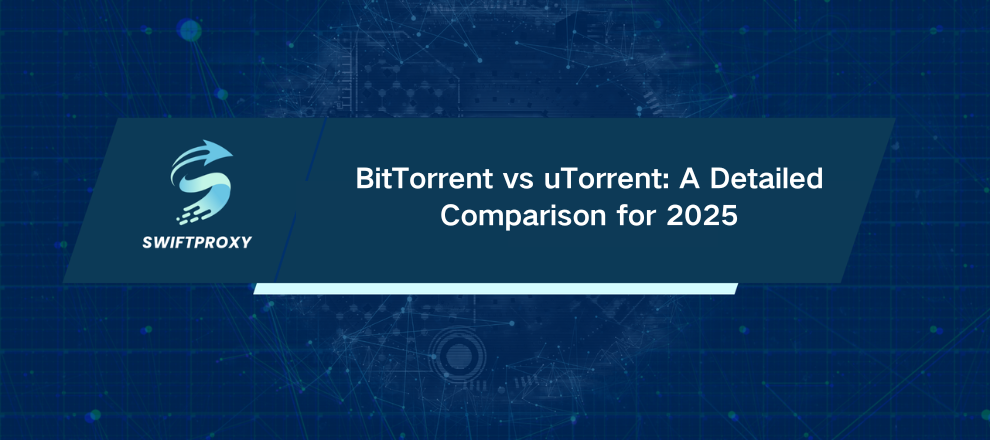BitTorrent vs uTorrent: A Detailed Comparison for 2025

The torrent world hasn't slowed down. Streaming services and video games keep hiking prices—sometimes into the stratosphere. Peer-to-peer (P2P) sharing remains the lifeline for millions hunting for content. For those exploring torrents, two names appear again and again—BitTorrent and uTorrent. They share the same origin and look almost identical, but each comes with its own set of subtle differences.
Let's cut through the noise. Here's the full breakdown of BitTorrent vs uTorrent: what sets them apart, how they perform under the hood, and what you should know about using them with residential proxies.
Roots and Ownership
BitTorrent launched in 2001, revolutionizing file sharing by decentralizing downloads. Instead of a slow one-to-one transfer, it pieces together files from multiple "seeders" all at once.
Fast forward to 2004—uTorrent appears as an independent client. It quickly wins hearts for being fast and lightweight. But in 2006, BitTorrent, Inc. acquired uTorrent and merged its code into their own, less nimble client. Today, both are owned by TRON, a crypto startup. That's no accident; the decentralized philosophy of torrents fits neatly with blockchain tech.
Interface and Usability
Open either client, and you’d swear you're using the same software. Both run on Windows, Mac, Android—and uTorrent even supports Linux, giving it a slight edge for open-source fans.
Installing them? Practically identical. Both try to slip in extra apps like RAV Endpoint Protection or McAfee Web Advisor. Be careful. Legit or not, you don't want extra bloat slowing your system or risking privacy.
Once installed, the interfaces are carbon copies: clean, straightforward, no surprises. Both are infamous for ads, but you can cut those out with a paid plan or a manual tweak.
Here's where BitTorrent sneaks ahead: it supports the BitTorrent File System (BTFS). Think decentralized cloud storage. Plus, it lets you earn BitTorrent Tokens (BTT) — their very own cryptocurrency. If you want to dip toes into crypto while torrenting, BitTorrent's your playground.
Performance and System Impact
Disk space? uTorrent is lighter, a mere 6.15MB vs BitTorrent's 3.58MB. RAM usage? Both are lean when idle—uTorrent sipping about 20MB, BitTorrent 31MB. Negligible for most modern systems.
How about download speed? We tested with legal torrents on Public Domain Torrents. uTorrent consistently edged ahead, topping out at 5.3MB/s compared to BitTorrent's 4.2MB/s. Under residential proxies, speeds dipped slightly but stayed close: uTorrent held 4.7MB/s, BitTorrent 3.7MB/s.
If you're torrenting behind a residential proxy, expect a mild performance dip but minimal impact overall. Both clients handle proxies well, but uTorrent's speed advantage might make it your go-to.
CPU and RAM when active? uTorrent stays lighter, maxing out around 100MB RAM and 3% CPU. BitTorrent leans heavier: 115MB RAM and up to 4.5% CPU. Not earth-shattering, but worth noting if you run torrents on lower-spec machines.
Safety and Privacy
Torrenting isn't a free pass to anonymity. Both clients expose your IP to peers. Neither offers built-in IP masking, so if privacy matters, pair them with a proxy.
Paid versions throw in malware scanning—but don't rely on it blindly. Your best bet: a trusted antivirus alongside your torrent client.
On the plus side, both encrypt P2P traffic. That's a solid line of defense against casual eavesdropping or ISP throttling.
The Bottom Line
uTorrent narrowly takes the lead. It's leaner, a touch faster, and supports Linux. BitTorrent, meanwhile, pulls ahead if you want to explore decentralized storage or crypto rewards.
For everyday torrenting, either will serve you well—they share the same DNA. But if speed and system efficiency are your priorities, uTorrent's your best bet. If the crypto side intrigues you, give BitTorrent a try.

















































